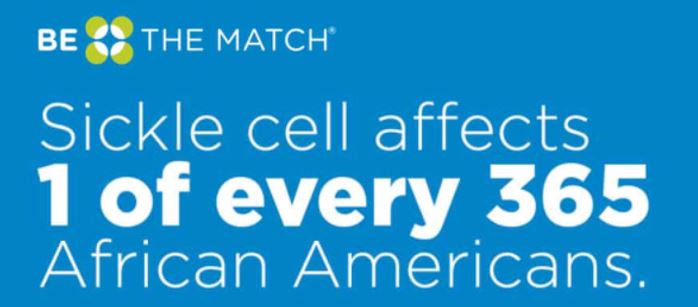MINNEAPOLIS, Sept. 4, 2020 — Sickle Cell warrior Tahir “StayFresh” Ali of Atlanta, Ga., visits the hospital twice monthly for blood transfusions to reduce complications from sickle cell disease, and manage his potential risk of organ damage or stroke. The 35-year-old music producer and manager estimates he has spent several years of his life in the hospital undergoing treatment for sickle cell disease. Finding a perfectly matched marrow or blood stem cell donor could give StayFresh a chance to live life free of sickle cell and the many complications that the disease presents.
September is Sickle Cell Awareness Month, and Be The Match, the National Marrow Donor Program, is launching several campaigns to help people to learn more about the disease, and take action to help those searching for a matching blood stem cell or marrow donor.
StayFresh is like 100,000 African Americans who battle sickle cell disease, an often-misunderstood genetic disease that is “invisible” because unlike many illnesses, people with sickle cell disease can lead active lives. However, people with severe sickle cell can face debilitating episodes of pain crisis and life-threatening complications. StayFresh is working with Be The Match to rally more Black and African Americans to join the Be The Match Registry.
Be The Match is also hosting a three-part virtual event series to raise awareness about sickle cell disease, provide free resources for patients and families affected by sickle cell, discuss treatment options, and the need for more Black donors on the Be The Match Registry. The event series and more information can be found at: SickleCellConnect.com.
“We are grateful to have a dedicated Patient Services team that is able to produce these informative virtual events to help sickle cell patients and their caregivers learn how to access free resources and advocate for themselves as they navigate their disease,” said Erica Jensen, Senior Vice President of Be The Match Member Engagement, Enrollment and Experience. “Nobody with sickle cell disease has to walk alone. Be The Match has a peer connect program, free professional counseling, nurse navigators and strong partnerships with organizations like The Sickle Cell Community Consortium and My Three Sicklers Foundation to ensure we can connect caregivers and sickle cell warriors with the resources they need to best manage this disease.”
According to the Centers for Disease Control, sickle cell disease is the most common inherited disease, affecting 1 in 365 Black or African Americans and 1 in 16,300 Hispanic Americans. With sickle cell disease, oxygen-carrying red blood cells are misshapen, hard and sticky, which can result in them getting stuck in blood vessels and clog them. This can cause severe pain crisis, infections, organ damage, low blood counts, stroke and other serious health problems.
Be The Match has also launched an informative online video called “You Are My Match” to raise awareness of the need for more Black or African American donors on the Be The Match Registry to help Black patients battling sickle cell disease find a potentially life-saving match. The video features a 4-year-old girl named Ruby from Lubbock, TX, who has been hospitalized more than 24 times and had three surgeries due to her sickle cell. Ruby’s doctors are recommending a blood stem cell or marrow transplant due to the severity of her condition, but she does not have a perfect match on the Be The Match Registry.
Part of the challenge Black patients like Ruby face when searching for a perfect match is low representation of Black or African Americans on the Be The Match Registry. Of the 22 million potential donors on the Be The Match Registry, just 4 percent are Black or African American. Because ethnicity plays a role in finding a match, Black patients will only find a perfect match 23% of the time, which is much lower than other ethnicities, such as White patients, who will find a match 77% of the time.
To learn how to access free resources, read stories about people cured of sickle cell disease following a marrow or stem cell transplant and to join the Be The Match Registry, visit: http://www.sicklecellconnect.com.

